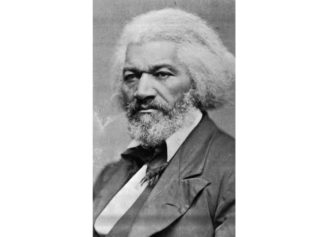A life-size replica of 19th century reformer and former slave Frederick Douglass is expected to soon grace the Capitol, making him only the third African-American to be so honored.
The House of Representatives capped a five-year battle with Monday’s passing of House Resolution 6336, paving the way to allow the statue of Douglass to represent the District of Columbia inside Statuary Hall.
The statue had originally been banned from the Capitol on the grounds that the District does not have statehood. Current rules allow only states to send two statues of their heroes to the Capitol.
There are 180 busts on display at the Capitol, but the ones of Martin Luther King, Jr. and Sojourner Truth are currently the only to honor African-Americans.
H.R. 6336 was sponsored by Republican congressman Dan Lundgren of California and co-sponsored by Democrat Eleanor Holmes Norton of the District of Columbia. Senator Charles Schumer (D-NY) introduced a similar resolution in June. The Senate is expected to pass the measure before requiring President Barack Obama’s signature to make it official.
Norton hailed the bill’s introduction in the House on Monday in her house website.
“I know that residents are as gratified as I am to see the House considering a bill allowing the District’s Frederick Douglass statue to be moved into the U.S. Capitol,” Norton said. “The city was so intent on having the Douglass statue here that it commissioned the statue and put it on display at One Judiciary Square. The statue would be placed alongside statues of other distinguished Americans and will be only the third statue or bust of an African American in the Capitol. This placement will be a fitting tribute to one of the nation’s most important human rights heroes.”
The District of Columbia had originally offered a statue of architect Pierre L’Enfant as well as Douglass to the Capitol and commissioned sculptors to construct both in 2007.
But the statehood issue doomed the idea, most recently in 2010.
H.R. 6336 did not include language about L’Enfant whose statute will remain in a D.C. government building at Judiciary Square.
“House passage is an important step in our effort to finally bring national civil rights leader Frederick Douglass to the U.S. Capitol, where his statue belongs,” Schumer said. “I will push for final Congressional approval by the Senate very quickly, so we can send this legislation to President Obama to sign by the end of this month.”
Born a slave in 1818, Douglass rose to become a prominent American abolitionist, author and orator.
His three autobiographies are considered classics of American autobiography, while his attacks on Jim Crow and the many lynchings of the 1890s helped raised public consciousness about their evils.
Douglass later edited an influential black newspaper for 16 years, achieving international fame as an accomplished speaker and writer decrying racism.


